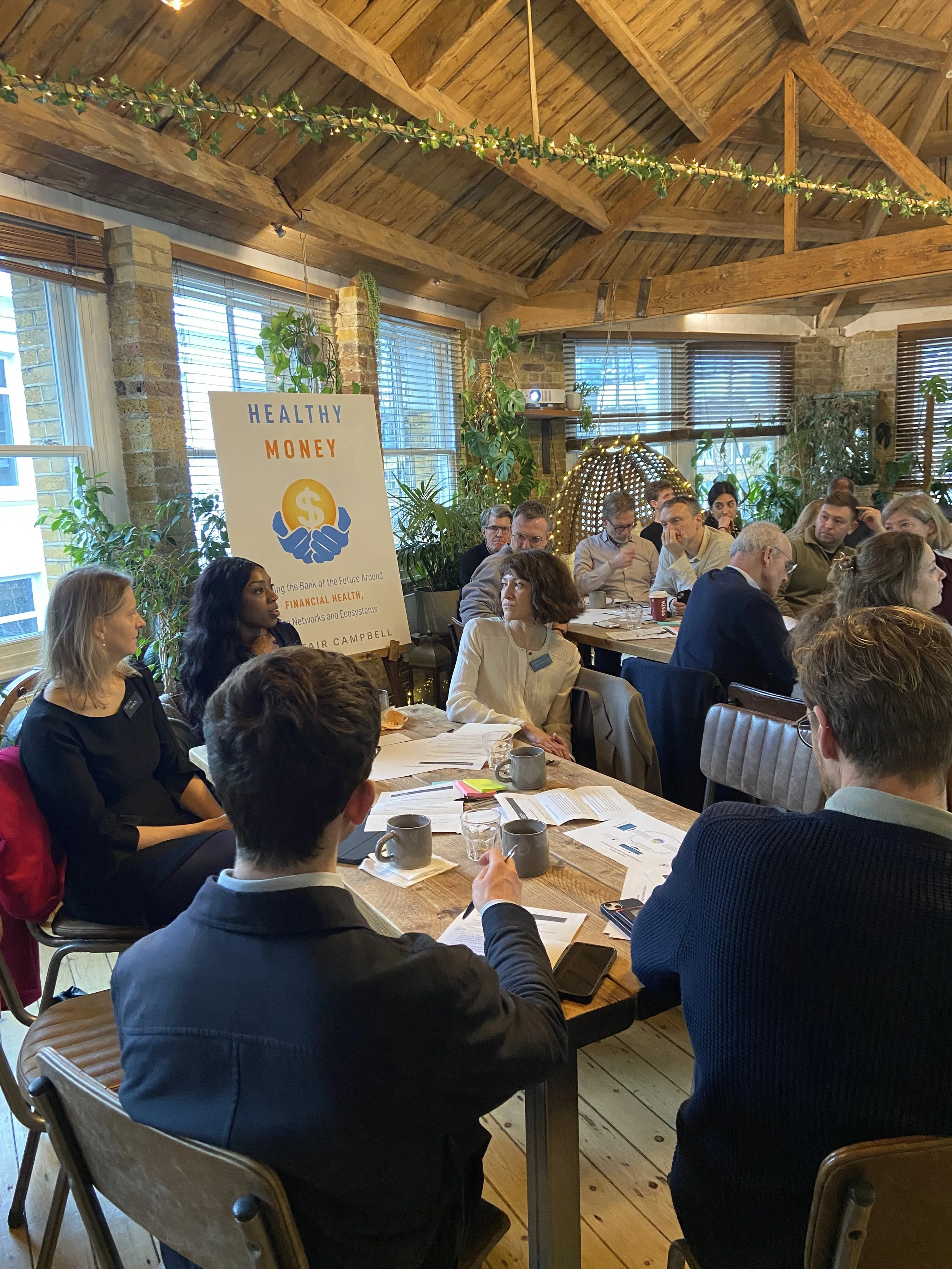“Banking Is Boring. Money Is Not.”
November 2025
A Conversation with Alastair Campbell
Alastair Campbell has spent his career at the intersection of digital innovation, customer experience, and financial systems. Having seen banking from both inside and outside the industry, he believes it still lags behind others sectors in creating mutual value and serving real customer needs.
That conviction underpins his forthcoming book, Healthy Money, and his work with the Economics of Mutuality approach. For Campbell, financial health is emerging as the new measure of success in banking – a shift from simply providing access to money toward helping people build stability, confidence and control over their financial lives.
This idea will be at the heart of the Healthy Money Roundtable in London, 22 January 2026, exploring how the concepts of financial health and mutual value creation can drive transformation across industries.
Find out more information about the roundtable and register your interest here.
“Healthy Money” book by Alastair Campbell
“Banking Is Boring. Money Is Not.”
The Economics of Mutuality approach calls on companies to create value by starting from a purpose that is broader than the company’s products or services. For Alastair Campbell, this perspective is especially relevant in financial services, where institutions have historically organized around their own balance sheets rather than their customers’ lives.
The industry often talks about how rapidly customer expectations have evolved – how digital natives demand new experiences and instant service. Campbell sees it differently. The fundamentals of what people want from money, he says, have hardly changed at all. What has changed is the technology that now allows banks to meet those timeless needs in new ways.
He cites Jeff Bezos’ observation that businesses should focus not on changing trends but on needs that never change. “Customers will always want money to be cheaper to manage, more convenient, more secure and more transparent,” he says. “The question is whether banks are willing to organize around those enduring needs.”
“People aren’t after banking,” he adds. “They’re after enriched financial lives.”
For Campbell, the industry has long overlooked the emotional reality of money. “After physical health, financial health probably causes the most extreme emotions people experience - stress, anxiety, pride, even shame,” he reflects. Yet banking remains flat and transactional, treating money as data to be processed rather than as something that shapes human lives. That disconnect, he believes, is exactly what a decentered, mutual value approach must address.
What Financial Health Really Means
Financial health, Campbell argues, can be as fundamental to human wellbeing as physical health or education. And just as medicine has evolved from only curing illness to promoting wellness, financial services must move beyond only fixing problems to promoting financial health more holistically.
The question of what financial health means was central to Campbell’s work applying the Economics of Mutuality approach while Group Head of Strategy at Natwest in partnership with Mutual Value Labs, an innovation agency in the Economics of Mutuality Alliance. He recalls reframing financial health not as a CSR exercise, but as a core business discipline focused on creating mutual value for both the bank and the people it serves.
“For me, being financially well means having control over your money, being able to withstand shocks and setbacks, and still enjoying the luxuries that make life meaningful,” he says. Through his work with Mutual Value Labs, these ideas – around capability, resilience and agency – came into sharper focus.
So-called “financial jugglers” (gig workers, contractors and many on variable incomes) are often highly skilled at this kind of active management. “They’re constantly sequencing bills, stretching resources, calling in favours,” Campbell explains. “It’s real financial expertise, just unrecognized by the industry.”
Much of people’s resilience is non-financial: shared childcare, neighbourly favours, small acts of reciprocity that sustain trust. “Money and trust are almost the same concept,” Campbell says. “All money really is, at its core, is a network of promises between people.”
By contrast, many of those designing financial products “live on six-figure salaries and rarely experience that kind of juggling.” The result is a system designed from the wrong vantage point – one that often fails the very people whose financial wellbeing is most at stake.
From “Customer-Focused” to “Healthy Money”
As early as 2013, Campbell was writing about the gap between what banks said about being “customer-centric” and what they actually did.
“At the time, customer focus meant making it easier to open an account or pay a bill,” he recalls. “All worthwhile but it was about making the customer’s relationship with the bank better, not their relationship with their money.”
True customer centricity starts with a different question: What does it take for people to be financially healthy?
Incumbents at a Crossroads
That question has never been more pressing. Today, many customers spread their finances across multiple providers, often supplementing their main bank with newer, more agile digital platforms for everyday transactions. They are looking for tools that help them manage cash flow, avoid unnecessary costs and adapt quickly when circumstances change.
“The danger,” Campbell warns, “is that incumbents mistake their legacy for security. You can’t run a 21st-century bank on a 20th-century operating model and expect customers to stay loyal.”
Supporting financial health, he argues, is something banks should do because money’s emotional and social impact is too significant to ignore.
It is something they can do because technology makes it practical.
And it is something they must do if they want to remain relevant.
Healthy Money Roundtable
In January 2026, these themes will come into focus at the Healthy Money Roundtable in London, convened by the Economics of Mutuality Alliance. The event will explore how purpose, customer-centric innovation, and leadership culture can inspire transformation across financial services industries, showing how businesses can thrive by improving the wellbeing of the people they serve.
To learn more about the event email Liam.Sharkey@mutualvaluelabs.com or register your interest using the form linked below.





